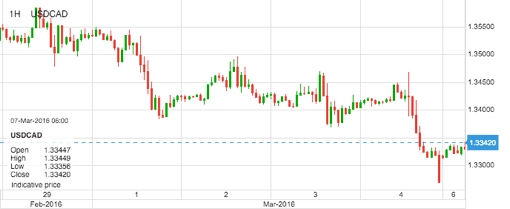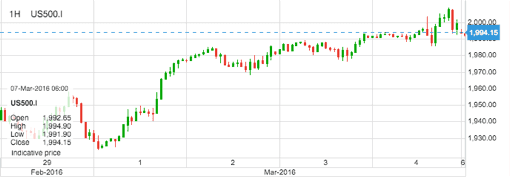Weekly Market Update 07.03.2016
USDCAD: Last week, USDCAD extended its six-week-long plunge. This became very steep on Friday after mixed US employment data weighed on the US dollar and crude oil surged due to both the weaker dollar and resilient equity markets. While Friday’s US non-farm payrolls report for February came out significantly better than expected at 242,000 jobs added vs. the expected 195,000, average wages unexpectedly declined, which provided another weak indication of inflation and renewed doubts over further Federal Reserve rate hikes in the near-term. As a result, the US dollar was mostly weaker on Friday, giving a boost to commodities including crude oil, which has broken out above major resistance levels for both the West Texas Intermediate and Brent Crude benchmarks. Put together, a moderately weaker US dollar and strengthening crude oil prices that boosted the oil-correlated Canadian dollar prompted USDCAD to extend its long slide since mid-January. In the process of this slide, the currency pair has tentatively broken down below major support level at 1.3400. Opening the week at 1.3505, the pair closed at as low as 1.3270. From a technical perspective, with crude oil having broken out above resistance and continued to recover since mid-February lows, and USDCAD having broken down below the noted major support at 1.3400, the technical outlook for the currency pair has become increasingly bearish.

S&P500: The S&P rallied last week, reaching and breaching the key 2000 level on the back of Friday’s non-farm payrolls report. Traders’ initial reaction to the data was joy as they saw the 242,000 NFP figure flash in their screens but then realised wages were weak (down 0.1% month-over-month), so they sold stocks and the S&P tumbled. But then the markets recovered as traders bought the dip possibly because they figured that the Fed may hold off raising rates again this year. At the same time, the weaker dollar helped to lift oil prices to fresh weekly highs. This also helped to fuel the kick-back rally. Should the S&P hold above 2000 then there is a good chance we will see even higher levels in the new week. Indeed, given the recent bullish price action, a rally to fresh all-time highs shouldn’t be a surprise.

UPCOMING KEY MARKET EVENTS
|
Date/Time* |
Currency |
Event |
Previous |
| 29 Feb/1000 |
EUR |
Consumer Price Index (YoY) (Feb) |
0.3% |
|
01 Mar/0330 |
EUR |
RBA Interest Rate Decision |
2.0% |
|
01 Mar/0815 |
USD |
Real Retail Sales (YoY) (Feb) |
-1.6% |
|
01 Mar/1500 |
USD |
ISM Manufacturing PMI (Feb) |
48.2 |
Time : GMT (Source: Fab Trader Platform)
Fixed Deposit Rates (USD)
| Tier | 30 Days | 90 Days | 180 Days | 360 Days |
|---|---|---|---|---|
| 50k-99k | 0.40 | 0.75 | 1.00 | 1.25 |
| 100k-499k | 1.50 | 1.75 | 2.00 | 2.50 |
| 500k-999k | 2.00 | 2.25 | 2.50 | 2.75 |
| 1 Million and above | 2.00 | 2.75 | 3.00 | 4.00 |
(Source: Fab Treasury)
Fixed Deposit Rates (EUR & GBP)
| Currency | 30 Days | 90 Days | 180 Days | 360 Days |
|---|---|---|---|---|
| EUR | 0.12 | 0.20 | 0.25 | 0.30 |
| GBP | 0.70 | 0.81 | 0.90 | 1.21 |
(Source: Fab Treasury)
Market Rates (from 5th - 11th October)
| Currency | Open | Close | High | Low |
|---|---|---|---|---|
| USDJPY | 113.690 | 114.540 | 112.143 | 113.725 |
| GBPUSD | 1.38558 | 1.42474 | 1.38330 | 1.42217 |
| EURUSD | 1.09205 | 1.10422 | 1.08237 | 1.10039 |
| AUDUSD | 0.71157 | 0.74410 | 0.71064 | 0.74349 |
| USDZAR | 15.57658 | 16.20808 | 15.25050 | 15.32378 |
| USDGHS | 3.86143 | 3.93493 | 3.86044 | 3.86044 |
| USDNGN | 198.12441 | 199.39086 | 197.71447 | 198.82740 |
| USDKES | 101.92043 | 101.59151 | 101.26420 | 101.37217 |
(Source: Fab Trader Platform & exchange-rates.org)
Metals and Stocks (from 5th - 11th October)
| Metal | Open | Close | High | Low |
|---|---|---|---|---|
| Silver | 14.4968 | 15.7740 | 14.5745 | 15.4858 |
| Gold | 1,222.48 | 1,279.54 | 1,215.69 | 1,259.01 |
| Stocks | ||||
| US 500 | 1,943.09 | 2,008.88 | 1,922.69 | 1,999.53 |
| HK 50 | 19,376.0 | 20,202.0 | 19,044.0 | 20,134.0 |
| UK 100 | 6,083.72 | 6,219.32 | 6,031.85 | 6,187.82 |
| Germany 30 | 9,432.95 | 9,897.45 | 9,324.45 | 9,795.55 |
(Source: Fab Trader Platform)
Farmers Rally to Support Britain Remaining in European Union
Feelings about the U.K. leaving the European Union fired up farmers and led the head of the British Chambers of Commerce to be suspended. John Longworth, director-general of the business advocacy group, was removed from his position after saying he favored the U.K. leaving the EU, the Financial Times reported Saturday. U.K. farmers, who in the past complained about EU rules on curved cucumbers and bendy bananas, say a “Brexit” vote on June 23 would cut them off from a market that is more than twice the size of the U.S. The campaign to stay in the EU, which is led by Prime Minister David Cameron, has focused on the economic and security threats of leaving the 28-nation bloc. “Brexit” supporters say leaving will let the U.K. boost domestic investments. A poll by YouGov conducted March 2-3 and released Saturday showed 40 percent of Britons would vote to stay while 37 percent back leaving. Support for leaving is up from 35 percent in a March 1-2 poll, YouGov said. In a keynote speech at the chambers’ annual conference in London this week, Longworth described the referendum on the EU as “a choice between the devil and the deep blue sea,” according to a transcript. He told Sky News after the speech that the U.K. would be better off taking a decision to leave the EU, based on his analysis. In a letter to The Times published Saturday, a group including Peter Kendall, head of the U.K.’s National Farmers’ Union, and QV Foods Ltd. Chairman Duncan Worth said leaving the EU could mean a cut in subsidies. They said they could still sell to Europe if Britain were to leave the EU but they would have to pay into the EU budget with no say on policies. The letter was signed by the industry’s biggest farmers and dairies. (Source: bloomberg.com)
Oil jumps as traders close short positions, U.S. producers cut rig count
Oil prices jumped on Monday, extending a rally that has lifted crude benchmarks by more than a third from this year's lows, as tightening supply and an improving global outlook strengthened the sentiment for a market recovery. Front-month Brent LCOc1 crude futures were trading at $39.49 per barrel at 0400 GMT, up 77 cents or 2 percent from their last settlement. That is up more than a third from a low hit in January, when prices fell to levels not seen since 2003. U.S. West Texas Intermediate (WTI) futures were trading at $36.63 a barrel, up 71 cents from the last close and 40 percent above lows touched in February. "It looks at this stage as if it (oil) has formed a little bit of a bottom and perhaps we're going to see a sustained price in the $30s, maybe trending back up to $40 dollars at some point," said Ben Le Brun, market analyst at OptionsXpress. Le Brun said an improved economic outlook was pushing prices: "The macro picture takes all corners of the globe into account, and those corners seem to be improving ... and that's where I'm seeing the oil price tick higher." Analysts said that strong U.S. payroll data had pushed markets on Friday and early Monday, but that attention was now shifting to Asia. Morgan Stanley said on Monday that China's parliament, the National People's Congress, which opens its annual session this week listed "to ease market barriers for transport, oil, and gas" among key policy targets this year. On the supply side, U.S. energy firms cut oil rigs for an 11th week in a row to the lowest level since December 2009, data showed on Friday, as producers slash costs. Drillers removed eight oil rigs in the week ended March 4, bringing the total count down to 392, oil services company Baker Hughes Inc (BHI.N) said. Beyond a tightening supply outlook, traders said a shift in sentiment was also lifting prices as they shut down short positions and abandoned bets on further falls in prices. (Source: reuters.com)
Why South Africa's Finance Chief Can't Quit
South African Finance Minister Pravin Gordhan is caught in a bind: his boss, President Jacob Zuma, and the nation’s tax commissioner are undermining his authority, yet he risks sending the economy into free fall if he resigns.
“The pressure is on him to fight it out,” said Daniel Silke, the director of Cape Town-based Political Futures Consultancy. “If the position becomes that untenable or he is intimidated to the point where he simply wishes to throw in the towel, it’s obviously his prerogative to do so. He would then witness what could be a disastrous market reaction.” Investor confidence in South Africa hasn’t recovered since Zuma decided in December to install little-known lawmaker David van Rooyen as finance minister. Four days later, after business leaders and ruling African National Congress officials complained and the rand and the nation’s bonds slumped, Zuma re-appointed Gordhan, 66, to the post he held between 2009 and 2014. (Source: bloomberg.com)



